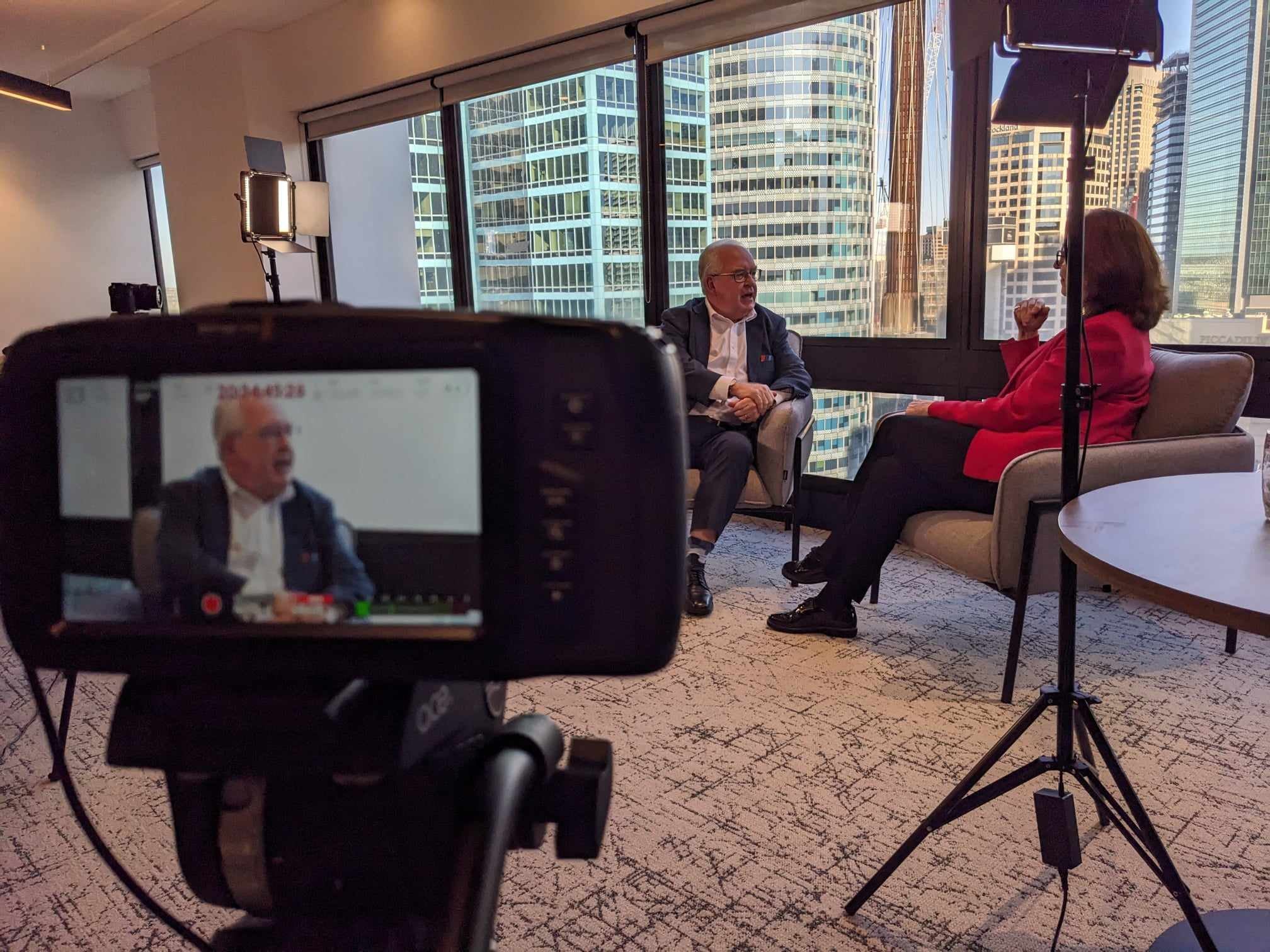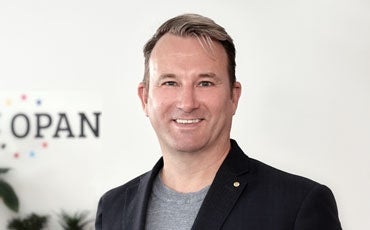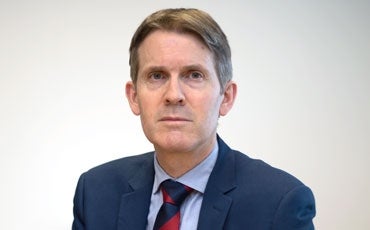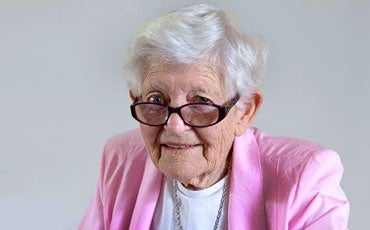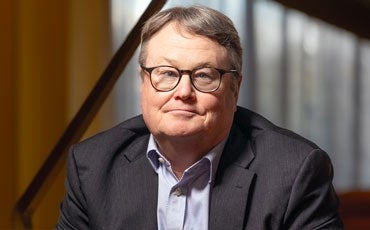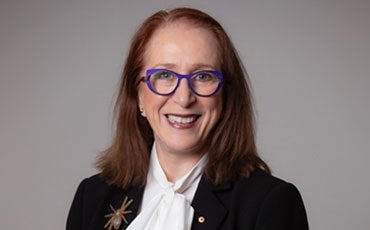About
In the interview series 'Let's Talk Ageing', the Age Discrimination Commissioner, Robert Fitzgerald AM, sits down with prominent Australians and thought leaders to discuss ageing positively and the human rights challenges facing older people.
The Q&As will come in a variety of formats, including written responses and recorded videos.
Episode list
Episode summary
Latest Episode: Bev Lange
In this World Elder Abuse Awareness Day (WEEAD) edition of Let’s Talk Ageing, Age Discrimination Commissioner Robert Fitzgerald AM sits down with Elder Abuse Action Australia’s (EAAA) Executive Officer Bev Lange.
Bev reflects on growing older in Australia and how she finds it a kinder place generally in terms of diversity, despite pockets of resistance. Bev considers how society is supporting older people who experience or are at risk of abuse and the importance of EAAA’s messages this WEAAD, including ‘Stand Up and Speak Out’, which is also the theme of the 2026 Australian Elder Abuse Conference. Bev embodies the spirit of that message in her deep conversation with Robert.
Episode 14: Yumi Lee
In this Let’s Talk Ageing episode, we hear from Older Women’s Network NSW Chief Executive Officer, Yumi Lee.
Yumi is committed to promoting the rights, dignity and wellbeing of older women through her work with the Older Women’s Network (OWN) NSW. Yumi highlights homelessness as a very real threat to women feeling secure as they age, she says: “Ageing is not just about wisdom and resilience; it’s about survival in a world that fails to plan for older women’s futures”. Read more from Yumi below.
Episode 13: Brother Thomas Oliver Pickett AM
In this Let’s Talk Ageing episode, we hear from Wheelchairs For Kids Australia Volunteer Factory Manager and 2025 Senior Australian of the Year, Brother (Br) Thomas Oliver “Olly” Pickett AM.
Br Olly co-founded Wheelchairs For Kids in 1996 to provide free adjustable wheelchairs for children in developing countries. Br Olly oversees more than 240 volunteer retirees every week in the factory workshop and a further 550 people from aged care and community groups who sew wheelchair soft support covers, and crochet rugs and soft toys for the children. He says the volunteers come from all sorts of careers: “I always get them to meet others and straight away they feel they belong. It’s the feeling of belonging that brings people back.” Read more from Br Olly below.
Episode 12: Liz Neville
In our next Let’s Talk Ageing episode, we hear from Director of the Australian Institute of Family Studies (AIFS), Liz Neville.
Liz is passionate about the broad and diverse definitions of families and the contributions older people make to family life. For her, this means being part of the “sandwich generation,” caring for an elderly mother from a distance, while juggling the demands of work and raising teenage boys.
She said AIFS welcomes diverse experiences and perspectives on the topics, trends and issues affecting contemporary Australian families, stating: “Old age spans a wide spectrum, including young-old, middle-old and old-old. Each stage has its unique benefits and challenges”. Read more from Liz below.
Episode 11: Dr Catherine Barrett
In our February Let’s Talk Ageing episode, we hear from Dr Catherine Barrett, CEO of Celebrate Ageing, a charity combating ageism and building respect for older people. Catherine is a Trailblazer of positive ageing, a researcher, collaborator and founder of The Kindness Pandemic, voted the world’s most uplifting Facebook group in the world in 2021.
Catherine’s research and projects have often had a gendered lens and Catherine is now working on the first gender analysis and planning tool for elder abuse services. A Gender Lens for Elder Abuse identifies key elements of gender specific approaches when providing elder abuse services. The tool can be applied to the experiences of older men and trans and gender diverse people. It was officially launched by Age Discrimination Commissioner Robert Fitzgerald AM this year.
Catherine sees ageing as a privilege and celebrating it something she works at “every single day”. Read more in Catherine’s Let’s Talk Ageing contribution below.
Episode 10: Ms Dorothy Hoddinott AO
In our first Let’s Talk Ageing episode for 2025, we hear from human rights and refugee advocate, and educator, Ms Dorothy Hoddinott.
Awarded the Australian Human Rights Medal in 2014 for her work with refugee and asylum seeker young people, Ms Hoddinott continues to pursue this advocacy work as part of her active volunteering. She sees many sides to ageing, including being able to put to use your lifetime accumulation of knowledge and experience, but without the “luxury of a lifetime ahead of you”.
Ms Hoddinott adds: “I think the key challenges for people as they get older include loss of agency and a sense of purpose in life... I may need to be dependent on others for the last years of my life. Until then, I plan on living life to the full.”
Episode 9: Innes Willox AM
In our final Let’s Talk Ageing episode for 2024, Age Discrimination Commissioner Robert Fitzgerald AM sits down with the Australian Industry Group’s Chief Executive, Innes Willox AM about some of the challenges and opportunities of ageing in Australia. Reflecting that he is “now closer to the end of work than the start”, Mr Willox speaks about growing awareness of the value of older people in Australian workplaces.
He shares insights into how his personal perspective is changing at the same time that there is a national mindset shift, driven by necessity and commonsense, to keep mature workers in the workplace: “Ageing necessarily gives you wisdom, it gives you a whole of patience but most importantly, it gives you perspective."
Episode 8: Professor Marian Baird AO FASSA
In this episode we hear from University of Sydney Business School’s Professor of Gender and Employment Relations, Marian Baird AO FASSA.
Professor Baird explains how life’s challenges intensify as people age, particularly for women, in an era she calls ‘the age of ageing’. Having co-authored a book about the multigenerational workforce, Professor Baird is keen to highlight the areas organisations can focus on to support older workers: “The way we work, and care need to adapt”, she said.
Episode 7: Craig Gear OAM
In this month’s episode we hear from Older Person’s Advocacy Network (OPAN) CEO Craig Gear OAM.
Mr Gear explains how his grandmothers’ insights into life and ageing led to his career in nursing and ultimately his current role as OPAN’s CEO. He strongly believes working with older people is key. OPAN advocates like Val Fell, whom he calls ‘the boss,’ push him to see the change that is possible when lived experience voices are at the advisory table.
Episode 6: Pat Sparrow
To mark the International Day of Older Persons, Age Discrimination Commissioner Robert Fitzgerald AM sits down with COTA Australia CEO Pat Sparrow.
COTA's role is to promote, improve and protect the wellbeing of older people in Australia. According to Ms Sparrow, Australia is currently not valuing its elders "as much as we should".
In their wide-ranging chat, Ms Sparrow discusses how she tackles her own ageing, how ageism is at the core of most challenges facing older people, and what she believes Australia needs to do to address their needs.
Episode 5: Dr John Chesterman
In the fifth of our series, we hear from Dr John Chesterman, Queensland Public Advocate and the Australian Human Rights Commission’s Expert Adviser for the report, Empowering futures: A national survey on the understanding and use of financial enduring powers of attorney.
In this interview, Dr Chesterman explains he has long advocated to close the safeguarding gap for adults at risk in the community, including the use of adult safeguarding networks to facilitate awareness and grow outreach to adults who are at risk of harms such as elder abuse. “I also encourage people more generally to reach out to people who are isolated, and to devise ways of providing opportunities for marginalised people to stay connected with others.”
Episode 4: Mrs Val Fell
In the fourth of our series, we hear from Mrs Val Fell, a member of the Australian Government's Council of Elders and the Older Person's Advocacy Network Older Person's Reference Group.
In this interview, Mrs Fell explains there are many challenges older people face, but at 95 years of age she is still advocating for an aged care system that is fit for purpose.
Episode 3: Mr Murray Coates
In the third instalment of our series, we hear from community transport campaigner and advocate for older people, Mr Murray Coates.
Mr Coates is Chief Executive Officer of the Australian Community Transport Association (ACTA).
In his interview, Mr Coates describes how many older people are socially isolated, which results in a lack of autonomy and independence. He says community transport is vital to connecting those people to the wider world. "We need to empower older Australians and give them as much control over their life as they want."
Episode 2: Dr Marlene Krasovitsky
In the second instalment of our series, we hear from esteemed advocate and campaigner Dr Marlene Krasovitsky.
Dr Krasovitsky is a board member of the grassroots anti-ageism movement EveryAGE Counts, and a consultant to the World Health Organisation's Global Campaign to Combat Ageism.
In her interview, Dr Krasovitsky discusses the "pervasive and highly tolerated" nature of ageism and the barriers it presents to older Australians, and the importance of public awareness to challenge harmful attitudes, stereotypes, and discrimination.
Episode 1: Em. Prof. Rosalind Croucher AM
In the first interview of this series, Age Discrimination Commissioner Robert Fitzgerald AM talks with outgoing President of the Australian Human Rights Commission, Emeritus Professor Rosalind Croucher AM, about ageing positively and some of the challenges older persons face from a human rights perspective.
Episode transcripts
- Latest Episode: Bev Lange
- Episode 14: Yumi Lee
- Episode 13: Brother Thomas Oliver Pickett AM
- Episode 12: Liz Neville
- Episode 11: Dr Catherine Barrett
- Episode 10: Dorothy Hoddinott AO
- Episode 9: Innes Willox AM
- Episode 8: Professor Marian Baird AO
- Episode 7: Craig Gear OAM
- Episode 6: Pat Sparrow
- Episode 5: Dr John Chesterman
- Episode 4: Mrs Val Fell
- Episode 3: Mr Murray Coates
- Episode 2: Dr Marlene Krasovitsky
- Episode 1: Em. Prof. Rosalind Croucher AM
Video episodes
A select number of episodes have been recorded as video. You can watch these episodes on the carousel below.

